I was walking across a bridge one day,
and I saw a man standing on the edge,
about to jump. I ran over and said:
“Stop. Don’t do it.”
“Why shouldn’t I? he asked.
“Well, there’s so much to live for!”
“Like what?”
“Are you religious?”
He said: “Yes.”
I said: “Me too. Are you Christian or Buddhist?”
“Christian.”
“Me too. Are you Catholic or Protestant?”
“Protestant.”
“Me too. Are you Episcopalian or Baptist?”
“Baptist.”
“Wow. Me too. Are you Baptist Church of
God or Baptist Church of the Lord?”
“Baptist Church of God.”
“Me too. Are you original Baptist Church of God,
or are you Reformed Baptist Church of God?”
“Reformed Baptist church of God.”
“Me too. Are you Reformed Baptist Church of
God, Reformation of 1879, or Reformed Baptist
Church of God, Reformation of 1915?”
He said: “Reformed Baptist Church of God,
Reformation of 1915.”
I said: “Die, heretic scum,” and pushed him off.
- First appeared in the Guardian 2006 CE – Blueprint for the previous Government’s Religious Discrimination Bill?
We knew this was going to happen
It will be seen if the fury being generated, as exemplified by the following article, will further divide America. This decision is terrible but unsurprising given the underlying pathology of judges prepared to remove a constitutional right and some of the incumbents in effect lying during their questioning by the legislators prior to appointment. This is a Court without shame – a mingle of sociopaths in the majority at the pinnacle of the American judicial system.

The root cause has been Donald Trump and his henchpersons, although Biden bears responsibility for the original appointment of Clarence Thomas.
The following article appeared in the Boston Globe in a State which sends no Republicans to Washington. The author of the article, Yvonne Abraham, grew up in Sydney, Australia, and has been working at the Globe since 1999. She has covered a wide range of national and local politics, immigration, and just about everything else over those years, as stated in her bio.
Since the Supreme Court ruling Governor Charlie Baker, a rare Republican elected official in Massachusetts, who supports the right to abortion, signed an executive order on Friday that he says will “protect reproductive health care providers who serve out-of-state residents.”
Governor Baker’s order bans executive state agencies from assisting another state’s investigation into a person or group receiving or performing abortions that are legal in Massachusetts or extraditing those patients or providers. The order addresses laws imposed in states that criminalise abortions and other services.
His order also protects Massachusetts abortion providers from losing their professional licenses or receiving other professional discipline based on potential out-of-state charges.
Meanwhile, Yvonne Abraham has written this fiery contribution to the debate.
Of course, that doesn’t make it any less enraging or terrifying. If anything, it makes it more so.
Many of us were certain this day would come, long before the leak last month of Justice Samuel Alito’s chilling draft decision overturning Roe. We’ve been watching it all unfold for years, exactly according to the plan anti-choicers have been trumpeting, loudly and entirely in the open, for decades.
We knew it in 2016, knew that if Hillary Clinton lost to Donald Trump, the right’s years-long plan to take over the Supreme Court, led by the utter, shameless partisanship of Senate Republican leader Mitch McConnell, would come to fruition, and we’d be exactly where we are today: Women will no longer have control over their own bodies in half of this benighted country. For millions of pregnant people, including victims of rape and incest, safe and legal abortion will now be an option only for those with the means to travel to a state that still — for now — provides that option. And now that Roe has fallen, decisions on other constitutional rights — including some big ones taken for granted by people who thought abortion was not their problem — will likely follow.
In a single week, this Supreme Court majority — this retrograde, opportunistic, political majority — has kicked over so many of this country’s moorings it’s hard to see how we keep standing: They blew through the separation of church and state, invalidated life-saving state gun safety laws, and now have overturned the constitutional right to an abortion with such force and argumentative sweep that contraception and same-sex marriage are now imperilled, too.
Again, it’s shocking, but it’s not surprising.
We. Knew. This. Was. Going. To. Happen.
What were all of those pro-choice voters thinking — especially the women — casting ballots for the orange menace who, with plenty of help from this court, tanked our democracy? Who couldn’t bring themselves to vote for a woman, or that woman, because she was insufficiently progressive, or because of her e-mails, or her laugh, or whatever other deal breakers they conjured to make their betrayal seem less shameful? Who chose nativism, hatred, and white supremacy over their own interests? Who embraced his world-view because it felt simple, comforting, even entertaining?
You can all sit down today. As can the rest of you who thought Roe didn’t have anything to do with you.
And just in case you still think that, Justice Clarence Thomas would like nothing better than to disabuse you of that notion, ASAP.
Thomas, married to an actual insurrectionist but still somehow on the nation’s highest, and apparently untouchable, court, spelled it all out in his concurrence: Since Roe has been overturned, the court “should reconsider all of this Court’s substantive due process precedents, including Griswold, Lawrence, and Obergefell,” he wrote.
Those cases allowed married couples to use contraceptives, held that states could not outlaw gay sex, and established a constitutional right to same-sex marriage. The whole plan is right there, out in the open, like it always has been.
No pro-choice senator had any business confirming these judges, whose entire careers and public statements gave the lie to their testimony on Capitol Hill.
The name of Maine Senator Susan Collins — the Republican who built a career in part on her support for abortion rights — should forever live in infamy. She went to the mat for nominee Brett Kavanaugh, giving a fiery speech in which she professed her absolute certainty that he would not vote to overturn Roe. That speech, disingenuous then, or hopelessly gullible, is utterly disqualifying now. The West Virginia Democrat and filibuster fetishiser Joe Manchin can spare us his “alarm” over the fact that Kavanaugh and Neil Gorsuch broke his trust here. Ditto Lisa Murkowski, the pro-choice Alaska Republican who voted to confirm Amy Coney Barrett, whose record opposing abortion was the most blindingly obvious.
Not one more word on abortion, from any of them, ever. Unless that word is a “Yea” to abolish the filibuster and fix this.
We knew this was going to happen.
“We have been called chicken little for a long time,” said Rebecca Hart Holder, head of Reproductive Equity Now. “The sky really is falling. We weren’t making it up.”
As always, it is falling more heavily on some than on others: those who are poor, who have jobs and other obligations that make it impossible to travel, who don’t have access to information or services that could help them find care in a nearby state. Some of those women will face insupportable life options and some will die because of Friday’s decision.
And it is falling unevenly, in bits and pieces: Abortion will become illegal in 13 states now that the decision has come down. Thirteen more will follow in coming months. In some states, that means laws empowering any random citizen to take legal action against anyone who helps someone get an abortion.
If the zealots in the GOP have their way, the rest of the states will follow those. House minority leader Kevin McCarthy made that clear on Friday when he said “our work is far from done” when it comes to abortion. Former vice president Mike Pence celebrated the fact that Roe had been “consigned to the ash heap of history” and heralded the emergence of “a new arena in the cause of life:”
He went on: “We must not rest and must not relent until the sanctity of life is restored to the centre of American law in every state in the land.”
You get that? They’re coming after abortion in blue states like ours, too. Bless the Massachusetts Legislature for enacting the ROE act strengthening protections in this state, and the governor for Friday’s executive order protecting Massachusetts providers who help out-of-state residents with abortions from being targeted by authorities in states that make such help illegal.
But in this America, no right that riles the right wing is truly safe any more. This is as much a cynical political strategy as a heartfelt position: For decades, the GOP used abortion to whip up support from voters who would otherwise have little reason to back them. Now that the dog has caught the car, they need to continue the fight or risk diminishing that fervor. That means pushing for federal legislation extending the reach of today’s ruling to the entire country, including Massachusetts.
How do we respond to this?
We do all the things we need to do today: Take to the streets to make our voices heard, donate to funds that help those who would not otherwise have access to abortion services, talk to those who still don’t quite get what is happening here and why it matters.
But none of that is going to solve the main problem here — and it’s the problem at the heart of almost all that ails this country right now.
Clearly, it doesn’t matter to the GOP that large majorities of Americans believe in a legal right to abortion. What we’re seeing here is the triumph of a small-minded minority. And they’re succeeding because they’ve broken our democracy — have been breaking it, for decades. They stacked courts not only with judges who oppose abortion, but who are also willing to take an ax to voting rights. They filled state legislatures with people more than happy to keep themselves in power by making it harder for likely Democratic voters to cast ballots. They sent leaders in Washington who — as the hearings of the Jan. 6 committee have made tragically, abundantly, clear — are willing to gut what remains of our electoral system. Which is to say these are leaders who don’t actually believe in this country.
The only way to fix this is to vote against them, in November and beyond, and in numbers massive enough to overcome their attacks on our democracy.
Friday’s decision is but the latest chapter in this country’s most serious existential crisis since the Civil War era. When it comes to fixing it, it’s now or never.
We knew this was going to happen. And it’s going to keep happening.
The Monroe Doctrine
In the wars of the European powers in matters relating to themselves we have never taken any part, nor does it comport with our policy so to do. It is only when our rights are invaded or seriously menaced that we resent injuries or make preparation for our defence.
With the existing colonies or dependencies of any European power we have not interfered and shall not interfere. But with the governments who have declared their independence and maintained it, and whose independence we have, on great consideration and on just principles, acknowledged, we could not view any interposition for the purpose of oppressing them, or controlling in any other manner their destiny, by any European power in any other light than as the manifestation of an unfriendly disposition toward the United States – President Monroe December 1823.

James Monroe was a Virginian, the fifth President of the United States between 1817 and 1825. He held numerous positions in government, and during his long life he crossed the Delaware River with Washington on Christmas Day 1776 and was Secretary of State during the 1812 War. He had been involved in the Louisiana Purchase in 1803, and the purchase of Florida from Spain occurred during his Presidency. His Presidency coincided with the independence of South American countries from Spain and Brazil from Portugal.
The Monroe Doctrine in essence was a warning for European powers to stay away from the Western Hemisphere. This Doctrine did not stop the imperial USA from rampaging across the Hemisphere. Between 1908 and 2009, there were 56 incursions of American military and naval forces into the Caribbean and South and Central America including nineteen years occupation of Haiti (1914- 1934) and the Dominican Republic (1916-1924).
One of the spoils of the Spanish American war was the island of Puerto Rico. It was absorbed as a Territory. The Monroe Doctrine did not protect the independence of these countries. Only Cuba has been able to throw off the colonial yoke of its Northern neighbour.
The final nail into the Monroe Doctrine catafalque was the Falkland Islands war, where Reagan sided with his mate Margaret Thatcher against Argentina. At that time Argentina was governed by an unpleasant set of chaps, but a doctrine is a doctrine.
The Monroe Doctrine enabled American monopolistic practices. The notorious activity of the United Fruit Company coupled with the CIA inspired coup ended a decade of democratic rule in Guatemala in 1954, and probably had an accelerant effect on the Cuban revolution.
The problem with the Monroe Doctrine is that just mouthing the words “Monroe Doctrine” provides an apparently easy valid solution for Australia’s relationship with the nations of the South Pacific.
The suggestion recently that Australia participate in a more collaborative version of the Doctrine is confusing. If the suggestion is to develop better communication, more aid in the form of expanded health care and education, access to the Australia labour market to the countries of the South Pacific, I could not agree more.
But a Monroe Doctrine! No. Let us get this out of our vocabulary.
John Gilbert. Who?
Recently Garbo was published. Robert Gottlieb has written about the life of the Swedish born actress, Greta Garbo, concentrating particularly on the period between 1925 and 1941.

When I was young, and because she was still alive, Greta Garbo to me was a somewhat mysterious Swedish sea nymph; a beautifully coloured outline of what was once a wraith of some substance. She had become a recluse, and I wondered whether she would ever emerge. She was known for her tragedienne roles in a number of films, in both the silent and “talkies” eras. Yet why are people still interested in her? After all, she made her last film in 1941 and died almost 50 years later in 1990. Yet the books and articles keep being written.
I remembered her portrayal of Ninotchka, in a film of the same name. It was an American film released in 1939, just after the beginning of WW11. The film lampooned Stalin’s Russia. Even when I first saw it in my late teens, I had not realised her talents as a comedienne in her role as a Soviet apparatchik. The film has remained as one of the most memorable films of all time.
There are various reasons stated for why she keeps being remembered, as has been Marlene Dietrich. It is a strange situation, where most of the movie stars of the thirties are barely recalled, that memories of these two women remain. It seems that if you were still a “star” after the War, you are more likely to be remembered, especially if you have some unique characteristic – Garbo being a hermit and Marlene Dietrich with her vocal and visual magnetism. Both maintained their beauty well before plastic surgery had created a line of elderly kabuki dolls among their contemporaries.
Both Garbo and Dietrich were beautiful in their finely contoured features, their dark beautiful eyes and their exquisite silhouettes. The thin pencilled eyebrows, the unremarkable yet perfect noses but encased in cosmetic paint and powder verging on excess. These women were of another age, where they could not be airbrushed. You can see pictures of these women and may wonder how they looked in the morning. Neither would disappoint.
Garbo is thought to have had only one genuine love. It was difficult to substantiate anything as crass as reality in the world where relationships were the stuff of Hollywood gossip columnists.

The object of Garbo’s affection was an actor called John Gilbert. The only reason that name resonated with me was I remember my mother (who was hardly a film fan) would mention that she really liked John Gilbert. I never heard her say that about any other male actor. He was generally mentioned when my father would have a film night with his 8mm projector, which could only screen silent films, with much unintentional hilarity directed at the overacting melodramatics. It was quite a social occasion, as the film came in reels and therefore there were frequent intermissions while the reels were changed.
Gilbert to me, from his photos, was one of the vaguely repellent males, but popular in the Hollywood of the silent era, with slicked back hair, a pencil thin moustache and a dark, somewhat lascivious look – an exercise in black and white; whose looks today are fashionable among “lounge lizards”.
When Garbo and Gilbert fell for one another passionately on the set of Flesh and the Devil (filmed in 1926), the film director is quoted as saying: It seemed an intrusion to yell ‘cut!’ I used to motion the crew over to another part of the set and let them finish what they were doing. It was embarrassing.”
Garbo and Gilbert never married; there is a rumour that she fell pregnant to him. In any event, Gilbert’s career tumbled with the advent of sound. His voice was said not to be suitable, and with the steepness of his fall from matinee idol, he died in 1936 having drunk himself to death. Films in which he appeared are non-existent today; only the association with my mother made me stop and read about him.

The actress that my mother would read about was Marlene Dietrich, whose film “Blue Angel” is the classic melodrama of the manipulative woman leading the vulnerable man to ruin. Irresistible, Dietrich was quintessentially the uncensored Germany before the rise of Hitler, for whom she had a deep-seated loathing. Her renunciation of Nazi Germany and as distinct from Garbo her public profile developed after her shift to the USA and her work on its behalf during WW11 created an aura around her, a form of beatitude which followed her, while she lived life to the hilt.
Marlene Dietrich has always fascinated me. I always associated her with Berlin, the Berlin of the Weimar Republic. When I eventually went to Berlin, I found that city exciting. I thought of Dietrich, in that classic photograph, with top hat and lingerie. We don’t use the word “vamp” any longer.
Berlin did not disappoint. It is an entrancing place and sometimes I wished that I had been part of that “Cabaret” scene, a kind of straight Christopher Isherwood. Rather like Garbo. An oxymoron.
Signor Scarafaggio
Mentioning the Blue Angel reminded me of a time long ago when a group of us descended on this seafood restaurant of the same name in the inner Sydney suburb of Darlinghurst. The group had had a few sherbets, but the food at the restaurant at the time was very good, and the signature dish was lobster.
We were shunted into a backroom, presumably because we needed that space for our raucous members. Conversation flowed; wine flowed but there was some considerable delay in the menu. We sent emissaries out to see whether an avalanche had blocked the road to the kitchen
Then there was a lull. Suddenly people were pointing at the ceiling. “It’s not a plane; it’s not a bird; no, it was signor scarafaggio – a decent sized cockroach strolling along the plaster. Now cockroaches can be Australian, American or German squadrons. However, the Italian name is the most evocative. Hence my use of the name, which I say with that mixture of malice and relish. There are a number of us who suffer from katsaridaphobia, Scarafaggio said with a curl of the lip that sends shudders down the spine of such phobic sufferers.
I have been a student of cockroach movements. They would take up residence or fly in through the open windows. To me the only good cockroach is a dead cockroach, and they do provide a certain contest as they accelerate from a standing start unpredictably and reach a competitive speed, although mostly if they are scurrying across the floor, the contest is unequal and they get squashed with a sense of triumph on my behalf.

Now on this occasion, this cockroach on the ceiling was issuing a challenge. I immediately clambered onto the table, and pivoting, one slip-on shoe in hand, I killed it – with only two substantial clouts required.
The smacking noise on the ceiling was sufficient to alert the staff to this killing.
We were served very quickly after that. The lobster was delicious.
Fortunately, as a footnote, Signor Scarafaggio fell on the floor clear of any of our group.
Mouse Whisper
The family had an extravagant meal on Friday night. No, it was not caviar; no, it was not truffles. It was a classic Caesar salad as devised originally in Tijuana.
The ingredient with its value in gold was lettuce – fresh, crisp cos lettuce. There was nothing left after this epicure meal.






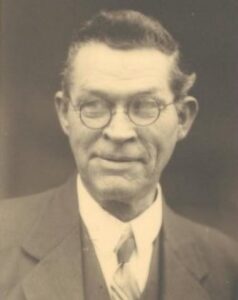
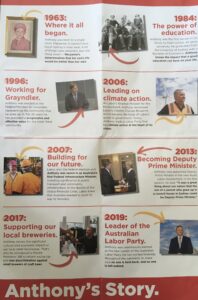 Then the drumroll – the achievement – supporting our craft brewers, no less. Set out in his brochure, he points out that he actually introduced a Private Members Bill to reform excise tax, and in his own words “end discrimination”. Reducing excise on grog is somewhat at odds with his first week of campaigning which concentrated on health matters.
Then the drumroll – the achievement – supporting our craft brewers, no less. Set out in his brochure, he points out that he actually introduced a Private Members Bill to reform excise tax, and in his own words “end discrimination”. Reducing excise on grog is somewhat at odds with his first week of campaigning which concentrated on health matters. When I devised the “Murray to the Mountains” intern training program in North-East Victoria early in the last decade, I planned that each intern would spend 20 weeks in general practice in their first year, and the practices were linked to the local hospital, where they would be confronted with emergencies as well as consolidating their medical, surgical and emergency terms at the local regional hospital. As many of the regional specialists visited these general practice health services, this model enabled the interns to gain even more experience. There were none of these extravagant waiting times to see a doctor and weekends were covered.
When I devised the “Murray to the Mountains” intern training program in North-East Victoria early in the last decade, I planned that each intern would spend 20 weeks in general practice in their first year, and the practices were linked to the local hospital, where they would be confronted with emergencies as well as consolidating their medical, surgical and emergency terms at the local regional hospital. As many of the regional specialists visited these general practice health services, this model enabled the interns to gain even more experience. There were none of these extravagant waiting times to see a doctor and weekends were covered. I have experienced medical care in a remote part of Tasmania. I needed the visit from a paramedic, not a doctor, at four in the morning. The paramedic had to come from a neighbouring town. He was quicker in responding than was the case with a similar call in Sydney, where the paramedic came from another suburb. What would a community health service along the ephemeral good-feel media announcement done for me – in a word nothing – at least not at 4.00 am as the paramedic did.
I have experienced medical care in a remote part of Tasmania. I needed the visit from a paramedic, not a doctor, at four in the morning. The paramedic had to come from a neighbouring town. He was quicker in responding than was the case with a similar call in Sydney, where the paramedic came from another suburb. What would a community health service along the ephemeral good-feel media announcement done for me – in a word nothing – at least not at 4.00 am as the paramedic did.
 It really is a bit pathetic; building one sporting venue after another when Australia needs to seriously address climate change – and the electrification of our cars, trucks and buses is just one of the priorities to accommodate this need. This is a nation with a trillion-dollar debt, financing an indulgent yet flimsy infrastructure so a few of one’s mates can own expensive jets, buy huge boats to cruise The Mediterranean and when the day is done, après-ski at Aspen.
It really is a bit pathetic; building one sporting venue after another when Australia needs to seriously address climate change – and the electrification of our cars, trucks and buses is just one of the priorities to accommodate this need. This is a nation with a trillion-dollar debt, financing an indulgent yet flimsy infrastructure so a few of one’s mates can own expensive jets, buy huge boats to cruise The Mediterranean and when the day is done, après-ski at Aspen.

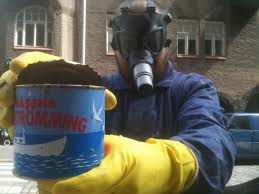

 Does Goffman give any clue as to how the inmate should respond? No, he does not. His analysis of various responses to lockdown is well catalogued whether monastery or mental hospital. The concept of a prolonged imprisonment was not seen as the consequence when the Virus first appeared early last year. Then a selection of politicians from both sides of politics participated in light-hearted advertisements to encourage hand washing. It was as though it was similar to the mood at the outbreak of WW1 when the early prediction was of the conflict being over by Christmas 1914.
Does Goffman give any clue as to how the inmate should respond? No, he does not. His analysis of various responses to lockdown is well catalogued whether monastery or mental hospital. The concept of a prolonged imprisonment was not seen as the consequence when the Virus first appeared early last year. Then a selection of politicians from both sides of politics participated in light-hearted advertisements to encourage hand washing. It was as though it was similar to the mood at the outbreak of WW1 when the early prediction was of the conflict being over by Christmas 1914.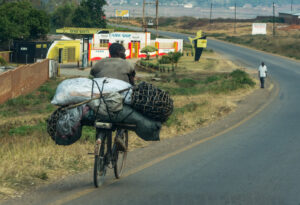


 In recent years, in New South Wales we have seen: a Minister of the Crown gaoled for bribery; an inquiry into a second, and indeed a third, former Minister for alleged corruption; the former Chief Stipendiary Magistrate gaoled for perverting the course of justice; a former Commissioner of Police in the courts on a criminal charge; the former Deputy Commissioner of Police charged with bribery; a series of investigations and court cases involving judicial figures including a High Court Judge; and a disturbing number of dismissals, retirements and convictions of senior police officers for offences involving corrupt conduct… No government can maintain its claim to legitimacy while there remains the cloud of suspicion and doubt that has hung over government in New South Wales.
In recent years, in New South Wales we have seen: a Minister of the Crown gaoled for bribery; an inquiry into a second, and indeed a third, former Minister for alleged corruption; the former Chief Stipendiary Magistrate gaoled for perverting the course of justice; a former Commissioner of Police in the courts on a criminal charge; the former Deputy Commissioner of Police charged with bribery; a series of investigations and court cases involving judicial figures including a High Court Judge; and a disturbing number of dismissals, retirements and convictions of senior police officers for offences involving corrupt conduct… No government can maintain its claim to legitimacy while there remains the cloud of suspicion and doubt that has hung over government in New South Wales.


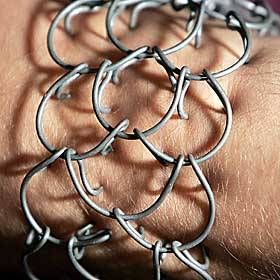



 In other words, we are all powerless unless those who make the laws, makes the law. For me, if I were in power in Australia, I would limit the arms being made available to police forces. They are not a militia – not a paramilitary force. When did the police change from a “service” to a “force”? They do not need armoured vehicles and tear gas to protect the community. All police forces should be restricted in the colour they use, so they do not resemble a posh group of “bikies”. Try pink as the colour for their uniforms – why do they have to dress in black or midnight blue? Get rid of the “aviators”. Be more selective in the range of ironmongery with which they adorn their uniforms. It would be such a change to see police showing compassion, on a regular basis, rather than presented as a novelty.
In other words, we are all powerless unless those who make the laws, makes the law. For me, if I were in power in Australia, I would limit the arms being made available to police forces. They are not a militia – not a paramilitary force. When did the police change from a “service” to a “force”? They do not need armoured vehicles and tear gas to protect the community. All police forces should be restricted in the colour they use, so they do not resemble a posh group of “bikies”. Try pink as the colour for their uniforms – why do they have to dress in black or midnight blue? Get rid of the “aviators”. Be more selective in the range of ironmongery with which they adorn their uniforms. It would be such a change to see police showing compassion, on a regular basis, rather than presented as a novelty.



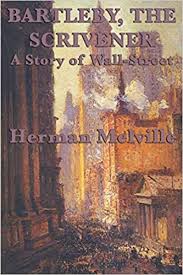




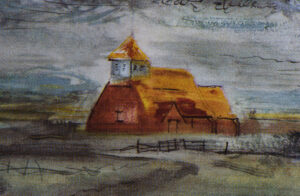


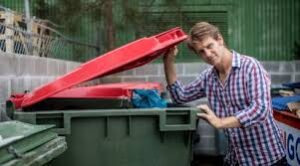
 Comfortably intermingled with Christian rhetoric and these Christian icons were explicit symbols of white supremacy. Outside the Capitol, Trump supporters erected a large wooden gallows with a bright orange noose ominously dangling from the center. These Trump supporters managed to do something the Confederate army was never able to accomplish — fly the Confederate battle flag inside the U.S. Capitol. One widely shared image showed a rioter with the Confederate flag strolling past a portrait of William H. Seward, an anti-slavery advocate and Abraham Lincoln’s secretary of state, who was seriously wounded as part of the broad assassination plot in 1865 that killed Lincoln.
Comfortably intermingled with Christian rhetoric and these Christian icons were explicit symbols of white supremacy. Outside the Capitol, Trump supporters erected a large wooden gallows with a bright orange noose ominously dangling from the center. These Trump supporters managed to do something the Confederate army was never able to accomplish — fly the Confederate battle flag inside the U.S. Capitol. One widely shared image showed a rioter with the Confederate flag strolling past a portrait of William H. Seward, an anti-slavery advocate and Abraham Lincoln’s secretary of state, who was seriously wounded as part of the broad assassination plot in 1865 that killed Lincoln.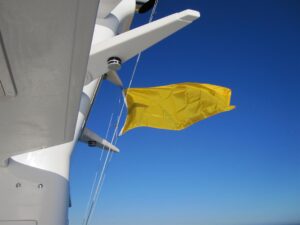


 Winter means virtually no tourists. We thus were able to move about and find that the next person was likely to be a Caulkhead, as the locals call themselves. When tourists arrive then the pace picks up and time to chat to find out why and how the island ticks diminishes. The ship’s chandler in Yarmouth – Harwoods – established in 1893 is a great place in which to ferret. We ended up with two models of working fishing boats, a couple of pennants and batteries. We resisted purchasing the brass clock and brass barometer, and one of the boats anyway turned out to be made in China. But who cares – the feeling of being in a seaside community, rather than being a working fishing village was strong.
Winter means virtually no tourists. We thus were able to move about and find that the next person was likely to be a Caulkhead, as the locals call themselves. When tourists arrive then the pace picks up and time to chat to find out why and how the island ticks diminishes. The ship’s chandler in Yarmouth – Harwoods – established in 1893 is a great place in which to ferret. We ended up with two models of working fishing boats, a couple of pennants and batteries. We resisted purchasing the brass clock and brass barometer, and one of the boats anyway turned out to be made in China. But who cares – the feeling of being in a seaside community, rather than being a working fishing village was strong.



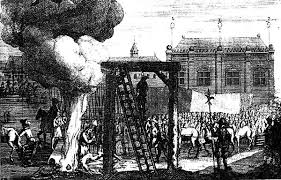
 However, the spectre of Parkinsonism is real, especially if theoretically there was a long life ahead of you before the Virus came. I wonder whether it will be associated with a loss of smell, one of the symptoms of the Virus infection, because that may suggest an entry point into the brain along the olfactory cranial nerve, which is not only the shortest cranial nerve but also originates in the brain itself (rather than the brain stem, unlike all the other cranial nerves, except the optic nerve).
However, the spectre of Parkinsonism is real, especially if theoretically there was a long life ahead of you before the Virus came. I wonder whether it will be associated with a loss of smell, one of the symptoms of the Virus infection, because that may suggest an entry point into the brain along the olfactory cranial nerve, which is not only the shortest cranial nerve but also originates in the brain itself (rather than the brain stem, unlike all the other cranial nerves, except the optic nerve).

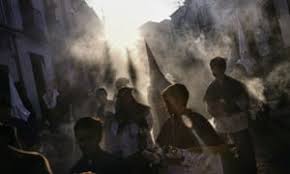






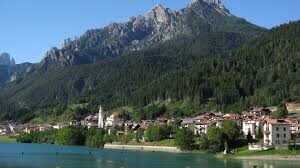




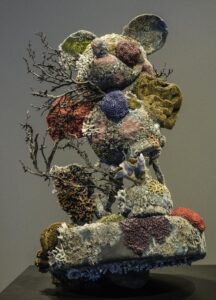


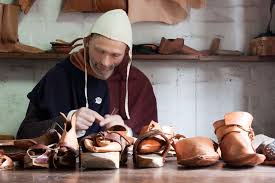
 I have one advantage. I have my marbles and I can look back over the past 20 years during which Treasury has put out a number of papers on this matter of ageing and the workforce – for what effect?
I have one advantage. I have my marbles and I can look back over the past 20 years during which Treasury has put out a number of papers on this matter of ageing and the workforce – for what effect?
